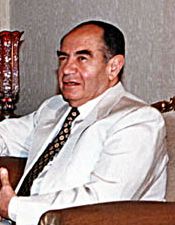Hikmat al-Shihabi
Hikmat Shihabi | |
|---|---|
حكمت الشهابي | |
 | |
| Member of the Regional Command of the Syrian Regional Branch | |
| In office 7 January 1980 – 1 July 1998 | |
| 16th Chief of Staff of the Syrian Army | |
| In office 12 August 1974 – July 1998 | |
| Preceded by | Yusuf Shakkur |
| Succeeded by | Ali Aslan |
| Head of Military Intelligence | |
| In office 1970–1973 | |
| Preceded by | Ali Zaza |
| Succeeded by | Ali Duba |
| Personal details | |
| Born | 8 January 1931 Al-Bab, Aleppo Governorate, Syria |
| Died | 5 March 2013 (aged 82) |
| Political party | Ba'ath Party |
| Awards | Hero of the Republic |
| Military service | |
| Allegiance | |
| Branch/service | |
| Years of service | 1952–1998 |
| Rank | |
| Unit | 10th Armoured Division |
| Commands | 10th Armoured Division |
| Battles/wars | Six-Day War Yom Kippur War Lebanese Civil War Islamist uprising in Syria |
Hikmat al-Shihabi (Arabic: حكمت الشهابي; 8 January 1931 – 5 March 2013) was a Syrian military officer who served as the chief of staff of the Syrian Army from 1974 to 1998.[1] A Sunni Muslim, he was considered one of the few non-Alawite members of the inner circle of former Syrian President Hafez al-Assad.[2]
Early life and education
[edit]Shihabi was born into a Sunni family in 1931 in Al-Bab, Aleppo province.[3][4][5] He attended Homs military academy and then had advanced military training in the United States.[5]
Career
[edit]Shihabi began his career in aviation, training in the Soviet Union and the United States.[3] From 1968 to 1970 he served as deputy head of the military security directorate.[6] In 1970, he earned a Soviet degree in intelligence services. In April 1970, he was named head of Syrian military intelligence, with Colonel Ali Duba serving as his deputy since 1971. He was promoted to a general the following year, and supervised the department of military security. After the 1973 Yom Kippur War, he led the Syrian delegation to the United States in April 1974, negotiating the conditions of the Syrian–Israeli disengagement. On 12 August 1974, he was appointed chief of staff of the Syrian Army, replacing Youssef Chakkour, who was promoted to deputy defense minister. In December 1983, while President Hafez Assad was ill, Shihabi was part, along with General Mustafa Tlass and Ali Duba, of the committee in charge of running the country.[1] From 1994 to 1995 he was part of a delegation that traveled to the United States to discuss peace negotiations with Israel.[1] His term as chief of staff lasted until 1998.[6]
Shihabii was also one of Ba'ath Party's four-member “old guard” members of the Regional Command.[7]
Resignation
[edit]On 8 July 1998, after serving 24 years as army chief of staff, Shihabi resigned his position ahead of Hafez Assad’s death and was succeeded by Ali Aslan.[8][9] Citing health issues and a heart condition, Shihabi explained his resignation to President Assad, who had wished to extend his service.[10] In 2000, Syrian newspapers circulated rumors, later debunked, that Shihabi would be indicted on corruption charges.[11]
Alliances
[edit]Shihabi was one of the senior Syrian officials who were close to late Rafik Hariri, former prime minister of Lebanon,[12][13] and Lebanon's Druze leader Walid Jumblatt.[14]
Death
[edit]Shihabi died on 5 March 2013.[3]
References
[edit]- ^ a b c Faure, Claude (2002). Dictionary of the Israeli-Palestinian Conflict: Culture, History, and Politics. Macmillan Reference USA. p. 432. ISBN 978-0-02-865977-0.
- ^ Drysdale, Alasdair (1991). Syria and the Middle East peace process. Raymond A. Hinnebusch. New York: Council on Foreign Relations Press. p. 28. ISBN 0-87609-105-2. OCLC 24068106.
- ^ a b c "Syrian army mourns death of former chief of staff". China. 5 March 2013. Retrieved 5 March 2013.
- ^ "Assad retires chief of staff, sacks intelligence chief". Hurriyet Daily News. Cairo. AP. 4 July 1998. Retrieved 8 March 2013.
- ^ a b Sami M. Moubayed (2006). Steel and Silk. Cune Press. p. 83. ISBN 978-1-885942-40-1. Retrieved 3 April 2013.
- ^ a b Eyal Ziser (2001). Asad's Legacy: Syria in Transition. C. Hurst, Publishers, Limited. p. 34. ISBN 978-1-85065-450-6. Retrieved 3 April 2013.
- ^ Bar, Shmuel (2006). "Bashar's Syria: The Regime and its Strategic Worldview" (PDF). IPS. Archived from the original (PDF) on 23 July 2011. Retrieved 12 March 2013.
- ^ Political Chronology of the Middle East. Routledge. 12 October 2012. p. 2038. ISBN 978-1-135-35673-6. Retrieved 10 February 2013.
- ^ Zisser, Eyal (September 2000). "Will Bashshar al-Asad Rule?". The Middle East Quarterly: 3–12. Retrieved 14 August 2013.
- ^ "خدام: خطيئة حافظ الأسد الكبرى أنه ورّث الحكم لبشار". www.aljazeera.net.
- ^ Ghadbian, Najib (Autumn 2001). "The New Asad: Dynamics of Continuity and Change in Syria" (PDF). Middle East Journal. 55 (4): 624–641. Archived from the original (PDF) on 12 December 2018. Retrieved 9 March 2013.
- ^ William Harris (19 July 2012). Lebanon: A History, 600-2011. Oxford University Press. p. 262. ISBN 978-0-19-518111-1. Retrieved 10 March 2013.
- ^ Mugraby, Muhamad (July 2008). "The syndrome of one-time exceptions and the drive to establish the proposed Hariri court". Mediterranean Politics. 13 (2): 171–194. doi:10.1080/13629390802127513. S2CID 153915546. Pdf. Archived 12 October 2013 at the Wayback Machine
- ^ Glass, Charles (1 March 2007). "The lord of no man's land: A guided tour through Lebanon's ceaseless war". Harper's Magazine. Archived from the original on 8 February 2013. Retrieved 9 April 2013.
